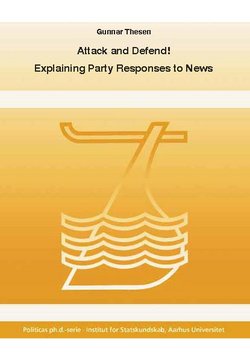Gunnar Thesen
Attack and Defend! Explaining Party Responses to News

This book investigates why political parties respond to news. It argues that the media’s political agenda-setting influence can be explained by party competition, policy responsibility and issue ownership. Opposition parties attack, responding to bad news because it reflects negative developments in social problems for which the government could be held responsible. The government defends the legitimacy of its position in office by a dual strategy: a proactive one, in which it responds to good news to politicize policy success; and a reactive one, in which it responds to bad news that explicitly addresses its policy responsibility to defend an image as responsive and competent.
Furthermore, parties are more likely to respond when news covers ‘their’ issues, believing that these deserve special attention and hoping for electoral gains if owned issues become salient. However, the impact of issue ownership is conditional: opposition parties will not politicize owned issues when news is good, as this brings public attention to government success; the government is on the other hand able, and willing, to prioritize owned issues only when news is good and the pressure to respond is low.
Findings from two empirical studies of party responses to news stories in Denmark generally support the ‘attack and defend’ model, suggesting that political logics are crucial to the broader concept of mediatized politics.
Udgivet november 2011
![]() Ophavsretten tilhører Politica. Materialet må ikke bruges eller distribueres i kommercielt øjemed.
Ophavsretten tilhører Politica. Materialet må ikke bruges eller distribueres i kommercielt øjemed.